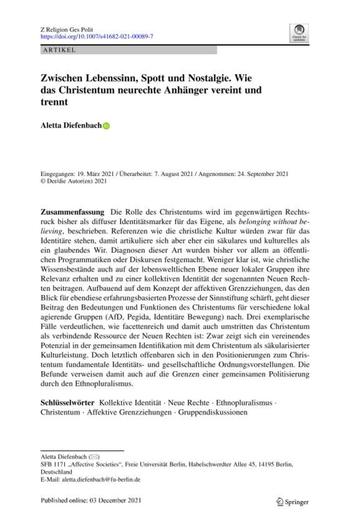Zwischen Lebenssinn, Spott und Nostalgie. Wie das Christentum neurechte Anhänger vereint und trennt
Diefenbach, Aletta – 2021
The role of Christianity in the current shift to the right has so far been described as a diffuse identity marker for the self, as belonging without believing. References such as Christian culture stand for the identitary, but they articulate a secular and cultural rather than a believing "we. Diagnoses of this kind have so far been primarily attached to public programmatics or discourses. What is less clear is how Christian bodies of knowledge also maintain their relevance at the lifeworld level of new local groups and contribute to a collective identity of the so-called New Right. Building on the concept of affective boundary drawing, which sharpens the view for precisely these experience-based processes of meaning-making, this article explores the meanings and functions of Christianity for various locally active groups (AfD, Pegida, Identitarian Movement). Three exemplary cases illustrate how multifaceted and thus also controversial Christianity is as a unifying resource of the New Right: It is true that a unifying potential is revealed in the common identification with Christianity as a secularized cultural achievement. But ultimately, fundamental concepts of identity and social order are revealed in the positioning of Christianity. The findings thus also point to the limits of a common politicization through ethnopluralism.
